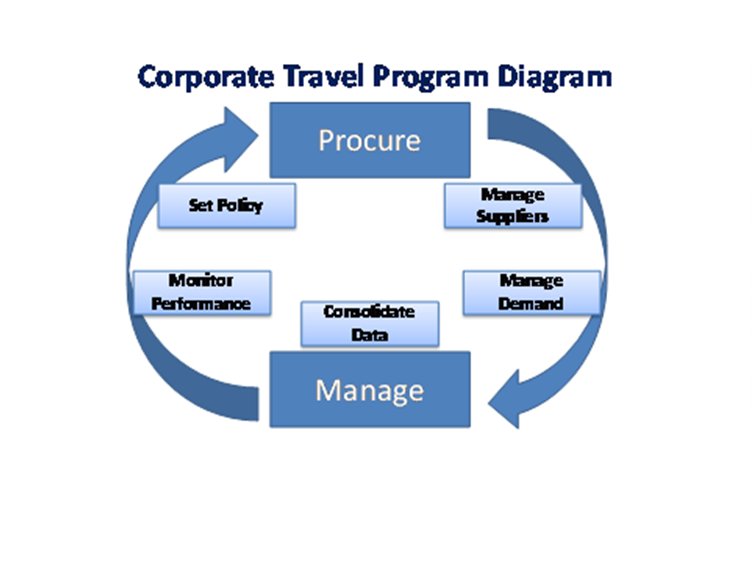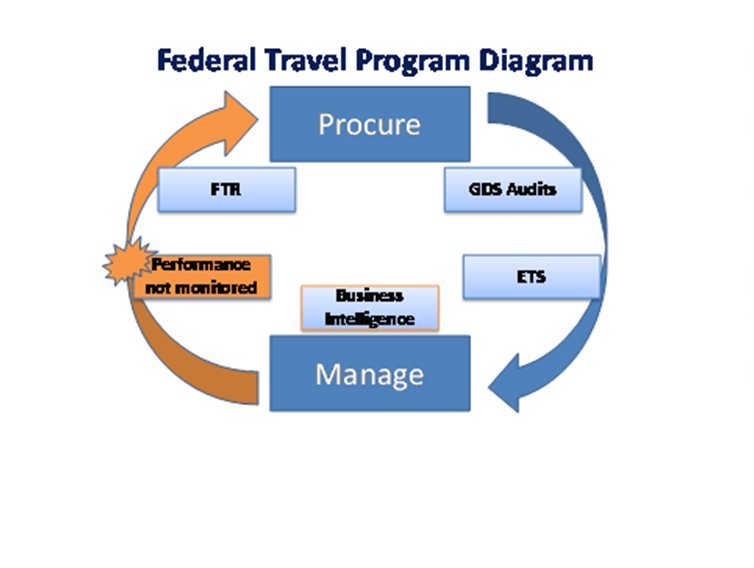When considering travel programs, program management and procurement are both essential. Once travel is procured, the role of the program manager is to focus on getting the maximum value from any and all negotiated agreements through careful follow up, tracking, and compliance monitoring. In turn, suppliers are more inclined to offer better deals if they believe the corporate client closely tracks usage, trains travelers, and communicates policy in ways that lead to significantly higher compliance levels. It is the combination of procurement and program management that leads to effective overall travel programs. In this paper I explore and assess the federal government’s approach to procurement and program management, and offer recommendations to solidify that dynamic. Let us first look at the corporate market.
Corporate Procurement
The basis of most corporate travel negotiations is a trade-off between incremental market share to the supplier and discounted pricing to the corporation. When negotiating contracts, corporations must be able to demonstrate their ability to shift market share to a given supplier.
Corporate Program Management
This ability to shift market share depends upon proactive monitoring and management of travel programs. Key areas that suppliers look to for evidence of effective program management include:
- Supplier management – ensuring suppliers abide by contract requirements and assist the corporation in promoting use of the preferred program.
- Demand management – compelling travelers to use the preferred programs via established tools, policies and processes.
- Consolidated Data – Consolidated company-wide travel data, which includes booked data, credit card data, travel agency data, and supplier data as appropriate.
- Performance Monitoring – Best practice is to establish centralized management of travel programs either by an individual (typically a Corporate Travel Manager) or by a team (Travel Council). This team communicates the program, trains travelers, and writes policy. In addition, they determine Key Performance Indicators (KPI) to monitor program usage, establish corrective action plans and drive continuous improvement.
- Policy – The Travel Council sets and enforces travel policy.
I depict high-level corporate travel program components in the following diagram.
Federal Procurement
Now let us review travel in the federal market. Although the government is not able to provide suppliers with the level of travel data put forth by most corporations, the government is proactive in procuring travel. The government has preferred programs for all major areas of travel including airfare (CPP), lodging (FedRooms) and car rental (Rental Car Program). Although rates are not negotiated in the truest sense (an exchange of volume for price discounts), rates are pre-determined and auditable.
Federal Program Management
The government has worked diligently in the recent past to establish and implement comprehensive travel programs. It is helpful to review government travel with respect to the same categories provided in the corporate market above. An assessment of the current state of government travel shows:
- Supplier management – GSA conducts audits of the GDS to ensure suppliers are correctly loading negotiated rates. In addition, GSA staff regularly meet with suppliers to discuss future program enhancements.
- Demand management – Most Federal Agencies have installed and implemented one of three E-Gov Travel Systems. These systems provide federal agencies the tool and structure needed to guide travelers towards use of preferred travel programs.
- Consolidated Data – Currently the government is unable to consolidate government-wide travel data. However, GSA has a contract in place to compile data through implementation of the Business Travel Intelligence system, and meaningful results are expected in the near future.
- Performance Monitoring – By current design, there is no centralized body within the Federal government that is responsible for monitoring performance or any overall travel program management. While GSA serves as a central body for procuring travel, performance to policy and compliance to preferred programs are left to individual federal agencies. In practice, individual agencies do little to ensure usage of preferred travel programs. This shortcoming breaks the continuum of procurement and program management. Because future negotiations are heavily dependent upon historical program usage, this lack of proactive oversight significantly reduces the government’s ability to leverage their travel volume.
- Policy – GSA and DoD establish and set travel policy via the Federal Travel Regulations (FTR) and Joint Travel Regulations (JTR) respectively. In addition Standardized Regulations (DSSR) are issued by the Department of State for foreign travel.
I show the same travel components within the context of government travel in the following diagram. As shown here, because the government does not proactively monitor program performance, the ability to leverage travel volume in future procurements is limited.
Summary
The federal government has taken great strides in developing a comprehensive travel program. The government has workable solutions in place for supplier management, demand management, and travel policy. Although consolidated government-wide travel data is not currently available, GSA does have a contract in place to provide it. The biggest remaining challenge is centralized management of government-wide travel programs. While a centralized approach to travel management would require that federal agencies turn over a small amount of control to a central body, the benefits of cost savings and higher traveler satisfaction would far outweigh this perceived loss of control.
Recommendation
I recommend that the federal government establish a government-wide travel program management office within GSA for the specific purpose of managing (monitoring performance, enforcing compliance, revising policy, etc) travel programs across the federal government. Giving GSA the authority to proactively manage travel on behalf of all federal agencies would mimic corporate best practices in that it would align procurement with program management functions. Without a centralized body managing government travel, the federal government will never be able to effectively leverage their $15+ Billion in annual travel spend.
by Ted Schuerman








